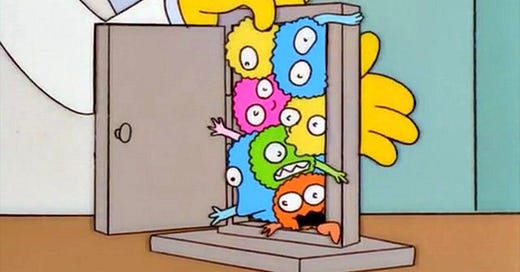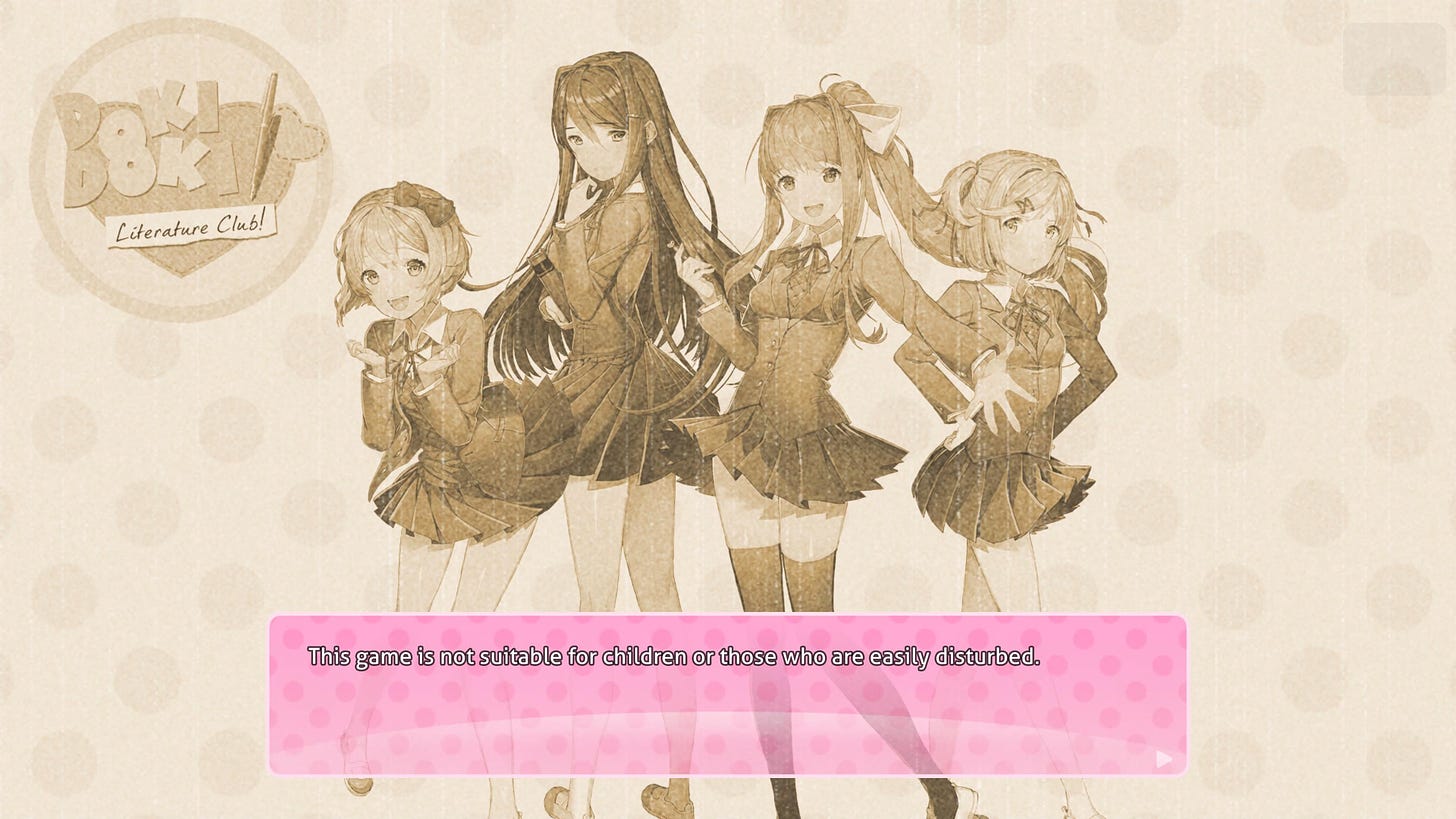There’s an episode of The Simpsons where the evil and elderly Mr. Burns receives news that he has every illness known to man. This turns out to be good news because every disease trying to get through the door at once means that none of them can get in, so Mr. Burns is “indestructible.”
I think about this scene a lot when I think of how the mainstream media in the U.S. covers Donald Trump. Most politicians would only have one major scandal. The media would then hammer that scandal until public opinion turned so strongly against that politician that they would have no hope of gaining reelection.
Donald Trump is a firehose of scandal, and when he’s not committing crimes, he’s saying incendiary things and doing so without shame. These are all the diseases coming through the door at once, and the media, despite having to cover Trump as a political figure for over nine years, has not cracked this problem. While it would be easy to say, “The media is in the tank for Trump,” I don’t think that understands the systemic forces at play.
If you thought a 24-hour cable news cycle was bad, the Internet hypercharged the need to fill time, and so our news cycle moves too fast for reporters to stick to a story if a new story comes along. To borrow a metaphor Jon Stewart employed about the media, it’s like watching a kids’ soccer game. If you get one kid alone with the ball, they’re pretty on top of it, and they can get it to the goal. But when every kid goes to the ball, it’s chaos. They all want to score, and no one understands that real soccer requires players to maintain their position on the pitch.
This model means that there’s no real focus or consistency unless the story remains the same and the subject responds to the story. Trump doesn’t do that. He does some horrible new thing and then whines about the “fake news” so he doesn’t have to acknowledge the lie he told or the awful things he believes. And in response, the media, rather than saying, “This is the single Donald Trump story we’re going to focus on,” can’t handle it. They’ve been overloaded, and so have viewers. That’s why Kamala Harris’ sensible line of attack has been, “Aren’t you tired of this nonsense?” You have to attack him on a macro level because no scandal breaks through, even though the scandals are appalling.
A good example transpired this weekend when, at a rally, Trump called for a “day of violence” by police to combat property crime. “One rough hour — and I mean real rough — the word will get out, and it will end immediately, you know? It will end immediately,” Trump said.
For a guy who has been the target of two assassination attempts and then whined about the rhetoric, one would think he might stop encouraging violence. And both times when Trump was targeted, his political opponents quickly said, “There is no place for violence in our politics.” But Trump disagrees; violence is a cornerstone of his political ideology.
And yet, this call for violence did not become a major story. Go to the New York Times homepage, and you won’t see it. Perhaps that’s understandable given the violence in Lebanon and the destruction by Hurricane Helene, but pop over to the Politics page, and you have to scroll down a fair bit to get to this story. The main story right now is about the upcoming debate between Tim Walz and J.D. Vance (I’m writing this on the morning of October 1st), and while perhaps that debate will be entertaining if the Presidential Debate between Harris and Trump didn’t move voters (Harris was ahead nationally by about 3% before the debate and she’s still ahead by about 3%), I seriously doubt the VP Debate will shift anyone.
The media’s failure to cover Trump isn’t a new story, but it is a galling one since we’re on Trump’s third run for President. I’m not asking the media to go easy on Harris or harder on Trump, but I think if you were to ask the editors of major publications, “Is a politician calling for a day of violence like we live in The Purge a bad thing?” they would likely say yes. And yet their reporting continues to lean on horserace stuff, so I’m not surprised that a low-information voter only has the vague ideas of “Trump does bad things” but can’t latch onto any specific incident. Even catastrophic events like his handling of the pandemic or his role in leading the January 6th insurrection do not register because four years ago is treated like ancient history rather than a clear record on which to judge a politician.
People marvel at how this election could be so close if one candidate is manifestly unfit for office, but most people don’t pay particularly close attention to politics, and they certainly don’t pay attention if a clear narrative doesn’t emerge. That’s why Steve Bannon (who’s currently in jail right now because people who work for Trump to go to jail, but he never does) was correct in his 2016 judgment to “Flood the zone with shit.” That’s what we’ve been wading in for nine years and what we’ll be dealing with for at least another 34 days.
What I’m Watching
I appreciated this interview between Jon Stewart and Ta-Nehisi Coates about Coates’ new book, The Message. Whether you agree with either man or not, I found this discussion refreshing because it’s between two guys who know they don’t have all the answers but are earnestly trying to find their way through past and current atrocities through intelligent discussion and consideration. While the conversation is also entertaining, it also feels like the kind of talks they have with others when not on camera.
What I’m Reading
I’m the third act of Character Limit, and as someone who got laid off last summer when new ownership took over the company, I can empathize with the Twitter employees. We all work hard and endeavor to do a good job at a place we care about, and then you’re swept aside not because of job performance but because the guy twenty rungs above you knows the fastest way to make money in the short term is to cut staff. One of the things the book reveals is that even though Elon Musk carried out broad, arbitrary layoffs, his predecessor as CEO, Parag Agrawal, was also planning mass layoffs to protect his position. This feels backward to me, where leadership is more about protecting your title and saying that’s what creates shareholder value rather than any labor that made the product appealing in the first place.
To return to Musk, I’m sure it looked good for investors when Musk laid off a bunch of people under the claim that it was making Twitter more efficient, but less than two years later, he’s lost those investors billions. Some may claim that the real investment was to get into business with Musk, but it’s odd how cutting employees brings a hard number on savings, but when that runs out, we’re back to intangibles like “Getting on a mercurial billionaire’s good side.”
In other reads:
Is Malcolm Gladwell Out of Ideas? by Anand Giridharadas [The New York Times] - When I read Malcolm Gladwell’s The Tipping Point twenty years ago, I was enraptured by it. Here were big ideas about how our world worked wrapped in terrific little narratives. However, over the past couple of decades, I’ve grown up seeing the flaws and over-simplifications in Gladwell’s writing, and he’s also become kind of gross (like trying to defend sexual predator Jerry Sandusky). However, as this scathing takedown of his new book shows, Gladwell has nothing new to offer, and his shtick of cutesy stories to illustrate generalized concepts is tired.
John Oliver Is Still Working Through the Rage by Lulu Garcia-Navarro [The New York Times] - I don’t really watch Last Week Tonight with John Oliver anymore. It used to be required Sunday viewing, but now it feels like regardless of how well-researched and well-argued it is, you still have aggressively depressing stories interspersed with jokes and maybe a mascot appearance. I appreciated this interview not because it wins me back to Last Week Tonight (which I’ll still watch on occasion) but because it provides some insight into why Oliver does the show, how comedy is a coping mechanism for dealing with painful, infuriating subject matter, and why he feels like his work is more op-ed than straight journalism.
Who Are the ‘Undecided’? by Rick Perlstein [The American Prospect] - I was toying with writing a newsletter about swing voters, but I think Perlstein largely gets to the heart of the matter here. One thing I would add is that I think a simplistic political media equates swing states to swing voters. States like Pennsylvania and Georgia are torn between two vastly different candidates because they have these voters carefully weighing the most obvious differences imaginable. The far more bland story is one of turnout rather than trying to convince a handful of low-information voters about how politics works. As Perlstein notes, you’re not going to reach these people by drilling down into policy because they don’t understand policy nor do they care that much about it. I’d also note that it’s far more effective to make sure your voters show up than trying to speak to voters who think Donald Trump cares about bodily autonomy.
What I’m Hearing
Back in August, I wrote about how our fact-checking industrial complex isn’t really fact-checking anything. A new bonus episode of If Books Could Kill gets into patient zero of the fact-checking game, The Washington Post’s Glenn Kessler, and why he’s so egregiously bad at his professed position.
What I’m Playing
I finished playing Doki Doki Literature Club, and after thinking it over, I am not a fan. I feel like the game’s true goal isn’t satire or critique but an exercise in breaking the fourth wall and using shock value under the auspices of horror to do it. And you can certainly unsettle someone by lulling them into a sense of safety with a generic dating sim that turns horrific, but the game isn’t interested in mental health beyond shocking imagery, which is nothing more than crass exploitation. For all of its disclaimers, these feel more like legal protections rather than an attempt to honestly explore notions like depression, anxiety, and abuse. All of that only serves as window dressing to a mild inquisition of the dating sim genre. Once the shock wore off, I found myself more annoyed with the experience than anything else.





